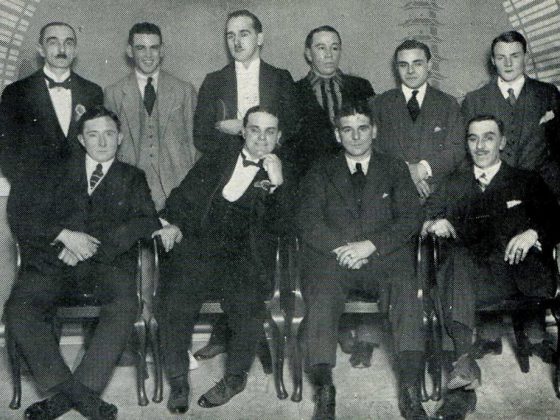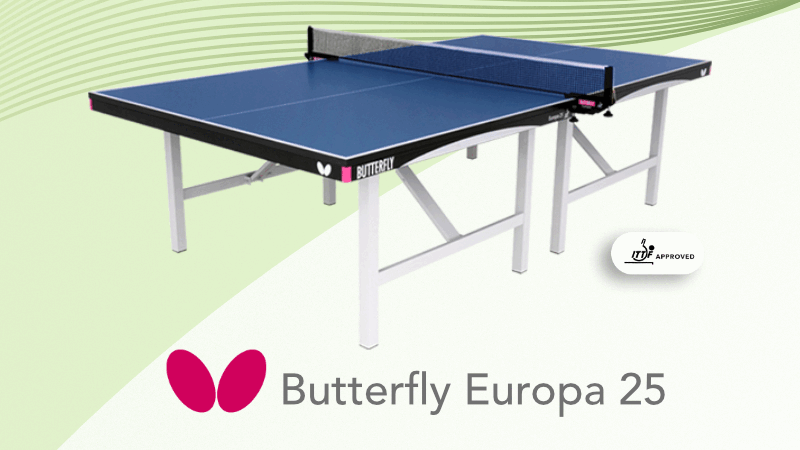It is 100 years since the very first England table tennis team competed in the international arena. Diane Webb, Chair of the Archives, Museum and Records Committee, looks back at the match and the players involved.
9th March 1923 is a very significant date in the history of English table tennis as it was the date of England’s very first international match, which was against Wales.
The match was played at The London Club, King Street, Baker Street, London W1 with eight men in each team. At that time the ETTA (English Table Tennis Association) had not come into being and the match was run by the Table Tennis Association with Rikki Berry as their Honorary Assistant Secretary.
The playing format for the international was all-play-all, one game up to 31. However, if the score reached 30-30, two clear points were needed for the win. The players had to change ends after every 10 points. A total of 64 matches were played with the winning team decided by the total number of games won.
England’s players were Percy Bromfield (London), E Woods (Manchester), Jack Swann (Manchester), Godfrey Decker (London), Thomas Hollingsworth (Wednesbury), Gilbert Belsten (Bristol), Edward Tapper (London) and Austin Carris (London). George Ross and Rikki Berry were the reserves.
The Welsh players were G Weaver (Cardiff), F Andrews (Thirty-Club), A Wiggins, (Penarth), A Matthews (Penarth), T Jones (Ebbw Vale), R Wiggins (Penarth), F Brown (Cardiff) and G Morris (Thirty-Club). Their two reserves were S Pugh (Ebbw Vale) and W Windsor (Thirty-Club).
The Welsh team were at a disadvantage as their Association’s rules only allowed them to play with plain wooden rackets whilst many of the English players played with rubber covered bats. With the differences in playing surfaces, it was perhaps not a surprise that England won the fixture, the score 52 games to 12.
Decker, Bromfield and Carris won all their eight matches, Swann won seven and lost one, Belsten won six and lost two as did Woods, Tapper won five and lost three and Hollingsworth won four and lost four.

So, who were these pioneer players?
Gilbert Belsten: The son of Bristol League’s first President, William Belsten. As well as playing in this first international Gilbert also played in the first World Championships in London in 1926 where he reached the last 32 in the Men’s Minor Singles. He won the Bristol & District League Men’s Singles title in 1921/22, the third year the tournament ran.
Gilbert was killed in 1929 when he was knocked down by a car, aged 29 years. In his memory a perpetual silver trophy was presented by his father to be played for each year with the proviso that any monies made were to be passed to local Bristol charities. The competition still runs today.
Rikki Berry: Reginald ‘Rikki’ Berry was a reserve in this first international but did gain his cap when he played against Wales on 17th January 1925 in London. England won that fixture and Rikki won his one match. Rikki also played in the 1926 World Championships and reached the round of 16 with his sister, Kathleen Berry, who won the English Open in 1922/23, 1923/24 and 1924/25. In 1923 Rikki was the Assistant Honorary Secretary of the Table Tennis Association.
Percy Bromfield: One of the greats of English table tennis being Chairman of the Ping Pong Association in 1921-22 and one of the main powers responsible for the revival of table tennis with Austin Carris (see below) and J J Payne.
Percy was later the Chairman of the Table Tennis Association 1922-23 and 1925-26 and a founder member of the ETTA. Percy played in four other internationals against Wales and was captain on all occasions. He also captained the Men’s team in the first World Championships when England won the bronze medal. In those championships he reached the quarter-finals of the Mixed Doubles with his daughter, Valerie, who was also an international and winner of the Women’s Singles and Mixed Doubles in the English Open in 1931.
Percy won the English Open Men’s Singles in 1923/24 and the Men’s Doubles in 1926/27 with Lionel Farris. He also won the All England Championships in 1903/04 and was regarded as the originator of the rubber faced bat at the beginning of the 20th century. For 25 years he was looked on as one of England’s greatest players and a master tactician. In 1931 he was made an ETTA Vice-President.
Austin Carris: First President of the All England Table Tennis Club and their chief organiser. President of the Ping Pong Association 1921-22 and with Percy Bromfield and J J Payne helped revive table tennis in the 1920s. First President of the Table Tennis Association 1922-23. An ETTA Vice-President 1934 and Honorary Life Member 1956.
As well as playing in the first international, Austin helped arrange the fixture. It wasn’t the only event he arranged as he also acted as Honorary Organiser for the National Table Tennis Competition run by the Daily Mirror in 1922 with more than 33,000 entries.
Austin was runner-up in the first English Open in 1922, losing to Andrew Donaldson. It was reported that Austin was resplendent in dinner jacket and diamond tie pin whilst Donaldson wore a collarless shirt, waistcoat and hob-nailed boots.
As soon as the Second World War broke out, Austin helped raise thousands of pounds for the Red Cross and other charities to provide aid. He was also heavily involved in golf, rugby, billiards and cricket.
Godfrey Decker: Godfrey was perhaps best known for his expertise in lighting, which he revolutionised. He was responsible for the equipment and lighting at all the major championships for many years, including five World Championships and 23 English Opens. Even in the 1966 European Championships he was still in charge of the lighting and equipment.
Godfrey helped organise the first Ladies and Gentleman’s Championships at Selfridge’s in Oxford Street in 1922 and also had a hand in organising the first international in which he played. The Honorary General Secretary of the Table Tennis Association in 1924-25 holding the same position of the ETTA in 1932-33, he also served on several ETTA committees. Deservedly made an ETTA Honorary Life Member in 1956.
Thomas Hollingsworth: The team was dominated by players from London and Manchester but Thomas was from Wednesbury in Staffordshire and had made his name by winning the Ping Pong Championships in 1913, beating Andrew Donaldson by 100 points to 69, and he won the tournament again in 1920, either side of the First World War, where he fought in the Battle of the Somme.
Thomas originally used a vellum racket before making his own wooden bat. There are few records of Thomas playing after his international debut but he maintained an interest in the game, attending the World Championships when it was held in Birmingham in 1977 – and also having the occasional knock with the legendary Adrian Haydon.
George Ross: George was a multi-talented sportsman representing England/Great Britain at not only table tennis but also at rifle shooting and gymnastics. He took part in the Olympic Games in gymnastics in 1908 and again in 1912 in Stockholm, where he won a bronze medal. Another major personality in the sport, George attended the initial meeting to consider forming the ITTF in 1926 in Berlin and assisted with drafting the ITTF rules and laws.
Although George was only a reserve in the first international he did play in the return fixture in Wales on 8th December 1923. This time the match was played to Welsh rules, which were one game up to 50 and the sum total of points were added to decide the winner – England again. George was made an ETTA Vice-President in 1933.
Jack Swann: As well as being a table tennis international, Jack was an excellent footballer and played in goal for Manchester City and Manchester United as an amateur, he also played for Liverpool. Being in goal seemed to be his forte as he played in that position in England’s water polo team and won the England Water Polo Championships in 1911, 1912 and 1913. Jack was heavily involved in the administration of table tennis at national, county and league level and was one of the founder members of the Manchester League in 1927.
Edward Tapper: Little is known about Edward apart from his appearance in this first international. He came from Middlesex and also played in the English Open in 1923 where he reached the quarter-finals in the Men’s Singles.
E Woods: Another player of whom little is known apart from that Mr E Woods was from Manchester. He played in the first two international against Wales. In the return fixture in December 1923 he won his match 50-38 against F W Brown and England won the match by 500-366 points.





